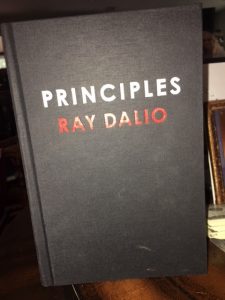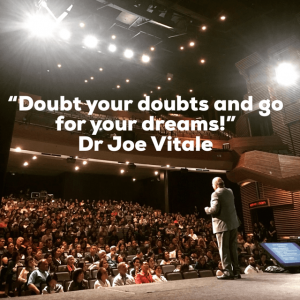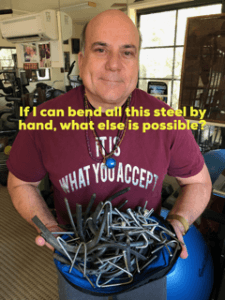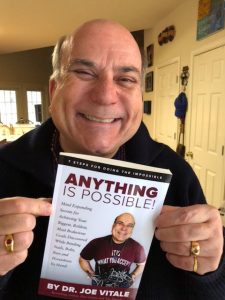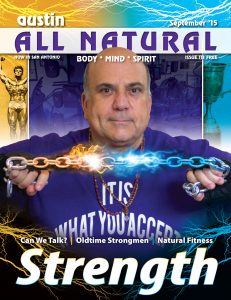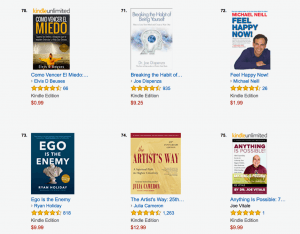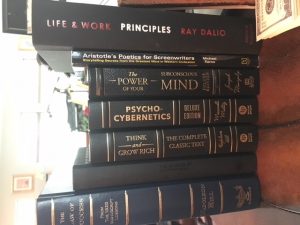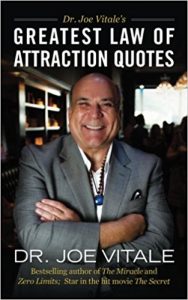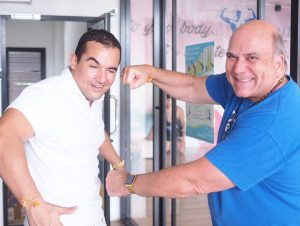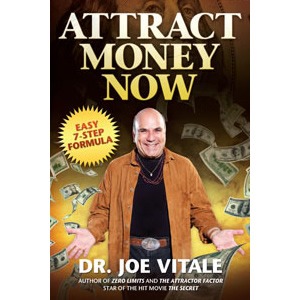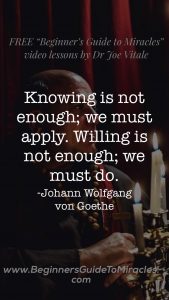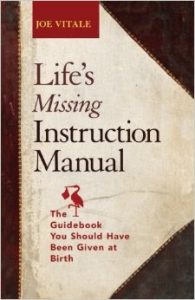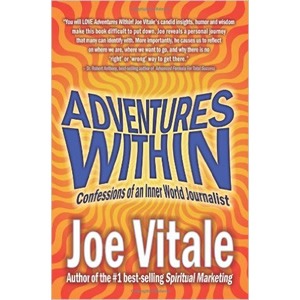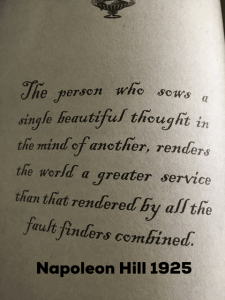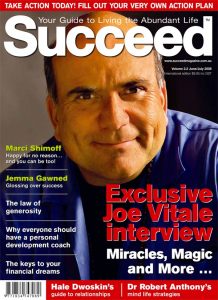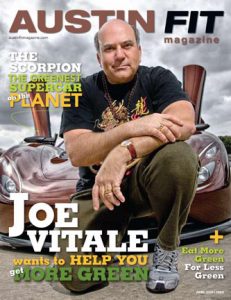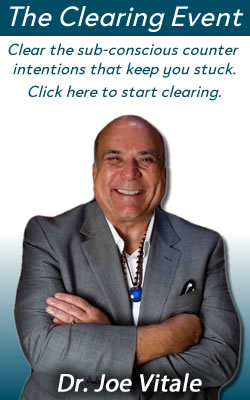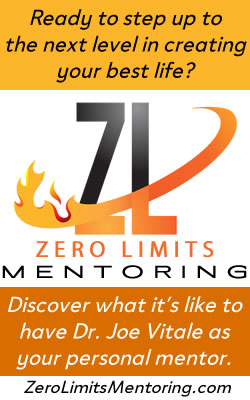Tag: mister fire
The One Question
My favorite book of last year was Ray Dalio’s bestseller, Principles.
While the book is 600 pages of wisdom and insight from the life experience of a billionaire, the single biggest takeaway for me was this one question –
“How do I know I’m right?”
Dalio learned to question himself and get the feedback of others in order to discover the best answer or action in any situation.
I almost never ask myself that question.
Stay with me for a minute and let’s explore this.
It’s easy to think and come to conclusions, but how do we know our conclusions are logical, practical, and the best of what can help us?
How do we know we aren’t deluding ourselves, or sabotaging ourselves, or missing better answers and solutions?
After all, our thinking happens in a confined inner world created from past experiences and limiting beliefs.
We can’t easily think “outside” of our thinking because we are the ones doing the thinking.
(Meditate on THAT.)
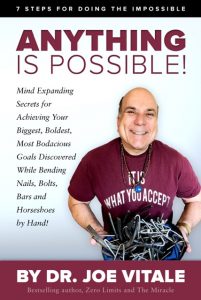
Even your intuition can be misread and misunderstood, as it has to be filtered though your beliefs, too.
A feeling can be a disguised limiting belief.
(Pause to let that sink in, too.)
So, what can we do?
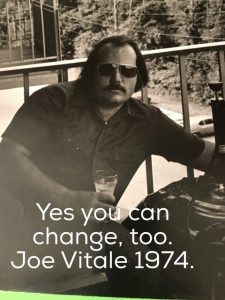
How do you get better answers, clearer decisions, and more reliable ways of seeing your choices?
For me, there are three solutions –
1. Get in a Challenging Mastermind Group.
Being in a select group with eight other people can elevate your thinking and expose you to new ways of thinking. It’s a smart way to pool resources and expand your mental paradigm. A mastermind has been the secret of the greats. I’ve created and been in many masterminds. I’ve even coauthored a book (with Bill Hibbler) on how to make your own mastermind in Meet and Grow Rich. I’m currently putting together an exclusive mastermind of high profile, high achievers to truly challenge us all to stretch and achieve at levels we only imagined before.*
2. Get a Miracles Coach or Zero Limits Mentor.
Having a trained person listen and reflect back to you your thinking can be enlightening and empowering. We rarely hear our own limiting beliefs but someone skilled in active listening can help you discover them with love and focus, and then help you begin to change them. Change your beliefs and you get a different reality. This is the main reason I created Miracles Coaching more than ten years ago and am currently creating Zero Limits Mentoring. A secret to success is to have someone who believes in you almost more than you believe in yourself.
3. Absorb diverse books.
Dalio’s book introduced me to new ideas and a way to question myself. But I also read other books to keep my mind expanding. It’s also why I write mind expanding and consciousness raising books, such as “The Miracle: Six Steps to Enlightenment” and my newest book, “Anything Is Possible: 7 Steps for Doing the Impossible.” Reading has always been a key secret to the success of high profile people.

I’m not here to sell you anything but to remind you that your thinking will be more powerful and much clearer once you allow greater input, and the three ways above can help you achieve that.
I’m sharing this with love.
Act as you feel inspired.
Expect Miracles.
Ao Akua
*Note: If you are interested in my exclusive Rings of Power Mastermind, contact my office or leave a comment below and I will see that you get my new manifesto describing it.
PS -The soulful Lisa Winston interviewed me recently on a subject you will love. Here it is:
Why Anything Is Possible
Consider –
* What would you try if you knew “Anything Is Possible“?
* What goal could you achieve if you knew “Anything Is Possible“?
* What dream could you make come true if you knew the 7 steps proving “Anything Is Possible“?
My latest book is a ball of fire in print.
It’s designed to help you attract, achieve and accomplish all of your dreams, goals and intentions using a new formula for success.
But it also might push your buttons.
It did someone on Facebook.
My new book is called –
“Anything Is Possible!”
It reveals –
“The 7 Steps for Doing the Impossible”
It explains —
This may be the most exciting and inspiring book I’ve written in years. At least in my humble opinion.
Strongman Grandmaster Dennis Rogers said –
“In January of 2017 Joe Vitale attended my annual strongman seminar: Oldetime Strongman University. By the end of the day he had twisted a horseshoe, bent a steel bar into the shape of a fish, and with one blow of his fist – drove a nail so far through a piece of construction lumber that he surprised us all. That morning he left his home as a 63 year-old guy. That evening he arrived home as a Strongman.”
The story of what happened that day, and what I learned afterwards and then applied to all areas of my life, is exactly why you’ll want to go get “Anything Is Possible.”
I’ve had people go get copies of this book in bulk – to give to family, friends, clients and peers – when they haven’t seen the book yet!
They’ve been hearing about my feats of strength, and seeing photos and video of me bending steel, and they want the inside secrets of such extreme accomplishment right now.
I’ve spoken about the stories and insights from the book on stages around the world, from Spain to Thailand, and people stand up and applaud because they get so inspired.
The 7 steps I reveal are unlike anything ever shared before – including by me.
Here’s an excerpt of what Mark Brody (who I don’t know at all) said in his five star public review on Amazon —
“…Joe Vitale goes into what you actually need to be doing in order to be successful. Yes, anything is possible, but there are steps to take in order to get there. Not just sitting there visualizing and wishing upon a star. This is truly a success manual.”
This is new, different, exciting, engaging and oh so much more. But don’t take my word for it. Look what others are saying:
Lisa Winston said this in her five star public review on Amazon —
“If you struggle with setting intentions, keeping commitments, taking action or if you just feel uninspired, ‘Anything is Possible’ will give you all you need to deliberately, methodically, successfully and joyfully achieve absolutely anything you choose to accomplish.”
Erica Garvin said this in her five star public review on Amazon —
“This book was my first introduction to Joe Vitale and his writing. Needless to say, reading this book was a turning point in my life. Never before has a book influenced me more to achieve life long dreams and goals. I believe this book is for anyone, especially those who might feel they are struggling in life and need tested methods to progress forward. Joe truly shows readers that anything that can be imagined can be obtained, and how to do just that.“
Fitness expert and personal trainer Scott York said —
“I loved this book. I learned a lot and laughed a lot at some of Joe’s colorful stories. I was inspired by it all.”
But, as you might imagine, not everyone agrees that “Anything Is Possible.”
Even though the book is urging you to stretch your mind to consider “Anything Is Possible,” some people use the idea to create limitations.
SIGH.
One person on Facebook posted the question, “What if you lose an arm and you want to grow it back, do you think anything is possible then too?”
I found it odd that someone would go to the outer limits of extreme examples to argue for limitations.
Richard Bach wrote, “Argue for your limitations and sure enough, they’re yours.”
Then I thought, given our current understanding of limb regeneration, growing an arm seems unlikely.
But that thought also assumes there will be no new research, or discovery, or inventions, ever.
EVER?
Obviously, life will continue to evolve and new discoveries will always be made.
In fact, that flippant question on Facebook got me curious.
I did a quick Google search on “human limb regeneration” and easily found this article posted on January 3 2018 at https://humanlimbregeneration.com/human-limb-regrowth-with-acorn-worm-dna:
“A group of scientists have been involved in a recent study in researching how human limb regrowth could one day be applied with the help of the Acorn Worm. They are looking at how amputees could regrow limbs and for patients to regenerate the spinal cord after injury.”
See what I mean?
There is always the possibility of something new being discovered or created.
So with that more empowering and optimistic belief, and that Google evidence, I stand by my book title: “Anything Is Possible.”
I’m saying it might happen.
I’m saying it could happen.
I’m saying it’s possible.
I’m saying “Anything Is Possible.”
And why not believe in possibilities rather than limitations?
Why not “Dare Something Worthy”?
Why not go for your dreams?
Why not tackle the big challenges of life with a mindset focused on solutions, not limitations?
“We have more power than will; and it is often by way of excuse to ourselves that we fancy things are impossible.” – Francois Duc De la Rochefoucauld
After all, people are creating new limbs using 3-d printers. That’s happening right now. (For proof, read Mick Ebeling’s great book Not Impossible: The Art and Joy of Doing What Couldn’t Be Done.)
I can’t help but wonder what’s next. Maybe it’s the Acorn Worm. Maybe it’s something else.
In my same Google search about “human limb regeneration,” there was a 2016 article at https://www.livescience.com/59194-could-humans-ever-regenerate-limbs.html that said –
“Human regeneration, he (professor David Gardiner) said, is likely still in the future, but not too far off — it’s possible one of his current graduate students or postdoctoral researchers will crack it, and limb regeneration will be a part of the medical toolkit.”
Are we living in exciting times or what?
“Everything is theoretically impossible, until it is done.” – Robert A. Heinlein
So much for the critical skeptic who posted his/her question on Facebook.
Obviously, Anything IS Possible.
My new book reveals “7 Steps for Doing the Impossible.”
But you are welcome to believe in lack and limitation instead.
Up to you.
The T-shirt I’m wearing on the cover of my new book shares my motto:
“It is what you accept.”
You can accept a victim mindset – “It is what it is” – or you can adopt a more empowered mindset – “It is what you accept.”
Your choice.
As philosopher/psychologist William James once said, “Belief creates its verification in fact.”
In short, you get what you believe.
If you are open minded, and want to believe in possibilities, my new book is now available on Amazon in print (and/or for your Kindle reader) and you can go get it right now at — https://www.amazon.com/dp/
Expect Miracles (unless you prefer to Expect Crap).
Ao Akua,
PS – Be honest: What would you do if anything really was possible?
Principles of Ray Dalio
The best book I read in 2017 was probably Ray Dalio’s Principles.
I say ‘probably’ as I read a bookstore full of books a year, and many get lost in the shuffle of turning pages.
If a book stands out, I tweet about it.
If it really sits up and rolls over, I write a blog post about it.
Dalio’s Principles made the cut for 2017.
I don’t know Dalio personally and actually never heard of him at all before I read his book.
He’s a billionaire entrepreneur and investor. He’s highly respected and successful.
After a lifetime of paying attention to what works in business and life, he compiled his “Principles.”
Apparently they were first put online.
They were downloaded over three million times.
When his book came out in 2017, it went to #1 on the NY Times bestsellers list.
Why did I buy the book when I didn’t know Dalio or his work?
A strong intuitive nudge urged me to preorder it.
Something about the title just said, “Read this next.”
As I’ve learned to do, I acted on that impulse.
And I’m glad I did.
The book is huge at almost 600 pages.
And it’s packed with wisdom.
I felt I was reading a software manual for life.
While Dalio sometimes comes across as a computer programmer, he’s actually more of a keen observer of life. As he finds insights that hold true, he writes them down as Principles.
Underneath Dalio’s drive is a prime directive that basically reminds him that he doesn’t know it all.
But the combined mind power of others could help him see objective reality and make clearer decisions.
At his TED2017 talk, he says, “Rather than thinking, ‘I’m right,’ I started to ask myself, ‘How do I know I’m right?’”
I love this question.
“How do I know I’m right?”
I love it because it’s so easy to deceive ourselves with our own thinking.
We can be illogical and not even know it.
When I coach or consult people, I often hear them say things they don’t hear as limitations. Until they invite outside input, they will continue to believe their own limitations.
It’s because thought is circular until you invite objective input.
Dalio solved this quirk of human nature by creating a way to judge the merit of an idea.
You don’t judge the person or the situation.
You judge the idea.
He calls it idea meritocracy.
Finding the merit of an idea.
One of the most unforgettable passages in the hefty book is when Dalio is told he has to have his esophagus removed.
Remaining as detached as he could, he decides to measure the merit of that recommendation.
He finds four other medical experts.
They all openly share.
They agree to a retest.
The result is Dalio kept his esophagus and changed a few basic lifestyle habits.
But he may have lost it due to the first doctor had Dalio not questioned the merit of his recommendation and been open to other experts opinions.
There’s abundance in this book.
I’ve folded back pages and underlined passages.
There’s no way I can memorize all his material. I have to keep a few basic principles in mind, such as –
“Reality is optimizing for the whole – not for you.”
“Pay attention to people’s track records.”
“Make your passion and your work one and the same and do it with people you want to be with.”
“Train your ‘lower-level you’ with kindness and persistence to build the right habits.”
“Almost nothing can stop you from succeeding if you have (a) flexibility and (b) self-accountability.”
Those principles seem stark and naïve sitting alone on the page.
Of course, those are only a handful of his principles and you’ll need to read his book to understand them.
But the book is friendly, easy, deep, and unforgettable.
Out of the thousands of books I’ve read and still own, only a handful make it to my desk, sitting at arms reach, to be seen or grasped at will.
They include legends, like Napoleon Hill’s Think and Grow Rich and Maxwell Maltz’s Psycho-Cybernectics.
Today I am placing Ray Dalio’s Principles in that little lineup of success classics.
Ao Akua,
Joe
PS – See my “Best Books Ever” list of 2015 at https://www.mrfire.com/law-of-attraction/best-books-ever/ for a sense of the books I read and like.
Homeless to Billionaire
Here’s the true story of yet another person who went from homeless to great success using The Law of Attraction, The Secret, and other self-help books and principles.
I’m in Bangkok, Thailand as I write this.
I was flown here to present at a two-day seminar on The Missing Secret to success.
The people were warm and loving, the event was sold out, the traffic was awful, the food was amazing, and the Thai massages between my presentations were deeply and unforgettably relaxing.
But that’s not the good part.
One of the organizers is a young man from Sweden. His name is Andres Pira.
He left Sweden 15 years ago out of desperation.
He was 20 years old and unhappy.
His life was going no where, he was tired of the ten months a year of darkness, and he needed a way out.
His grandfather died, left him two thousand dollars, and he used it to buy a ticket to the warmest country he could get to fast.
That turned out to be Thailand.
But Thailand was not an easy road for a young man with no contacts, no experience, and no ability to speak the Thai language.
Within a short period, he was homeless.
He slept on the beach.
He was too embarrassed to ask his family for help.
He contacted a friend and confessed that he was desperate.
The friend said, “I won’t send you any money, but I’ll send you a book that might help you.”
A book?
Andres was upset.
He’s starving and his friend is going to send a book?
The book was The Secret.
Andres read it.
And as he did, something awakened within him.
He started to realize that his thoughts were creating his reality.
Since he was homeless, he didn’t like what his thoughts had created.
He decided to learn and use the Law of Attraction to create a better life for himself.
The next book he read was Napoleon Hill’s classic, Think and Grow Rich.
After that, he read my first book on ho’oponopono, Zero Limits.
He was committed to change his life.
He succeeded, too.
Today he runs 19 companies, has 150 employees, and is a billionaire.
He is one of the largest real estate developers in all of Southeast Thailand.
One of his biggest properties in 2018 will be managed by Best Western Premiere.
But he also owns a gym, a law office, a gas station, several coffee shops and more.
He’s only 35 years old.
He told me this story after picking me up at the Bangkok airport.
I was fascinated.
Even though I had just spent 24 hours traveling – with 20 hours of that in the air – I was engaged and wanted to know more.
“You have to tell your story,” I said. “This is inspiring. People look at you and see a billionaire. They don’t see the homeless man who read self-help books and took action to recreate his life.”
“I have never publicly told my story,” Andres confessed. “It would seem like bragging.”
“It’s not bragging to admit you were homeless,” I explained. “How is being homeless a bragging point?”
He laughed.
I told him of my own struggle from homeless through poverty on to global success.
I tell my story not to brag, but to inspire.
I wanted Andres to do the same.
“You are hosting your first event this weekend,” I said. “Why not stand up at it and tell your story?”
He had never considered that idea.
Andres was nervous, but I coached him on how to present his case.
To his credit, he agreed to make his speaking debut at his own event.
He did, too.
And he was great.
People loved this young man and his honest rages to riches story.
Andres explained how he read The Secret, and then moved on to other books by the teachers of The Secret, including me.
In fact, Andres is so grateful for my books and audios impact on his life that he is taking me to Phuket, Thailand for a week of rest, all at his own expense.
As we continued our ride, he told me of various turning points in his life.
One was about giving.
Both he and his fiancé decided to start giving on their birthdays.
The traditional custom in most countries is to receive gifts on your birthday.
But Andres and his soon to be wife liked the Thai custom of not getting but giving.
So on his birthday, he went to orphanages with bags of gifts.
His fiancée did the same on her birthday.
They felt fantastic in making a difference in these children’s lives.
But Andres discovered another benefit to this giving.
“Right then I noticed my businesses began to grow and multiply. Somehow my giving triggered a receiving that I didn’t expect.”
Of course, I’ve written about giving in numerous books, including Attract Money Now.
But it’s always fortifying to hear of others proving the power of giving.
The more I spoke to Andres, the more I realized he deeply integrated what he learned from me and other authors, and yet made it his own and went beyond it.
I told Andres that he needed to write his life story, including his life and business lessons, and his meditations and visualizations.
Whether he wrote it, I wrote it, or someone else wrote it, I could see it transforming millions of readers.
Andres and I will be spending more time together in Phuket, so I may be able to get a fire started under him to share his life with you.
I hope you find this story as inspiring as I do. Again and again, we keep seeing evidence that the Law of Attraction works. But you have to not just read about it, but also apply it.
Andres did, and look at him now.
You can be next.
Ao Akua,
PS – Great news! I convinced Andres to let me help him with his book. You can expect it in 2019. It’ll reveal his story, secrets, principles, meditations, extreme sports insights, multiple business practices, and more. Meanwhile, learn from him and his wife, as I have. My birthday is this month. I plan to turn the tables on custom and my past and make this 64th birthday one of giving on the day I usually receive. You don’t need to wait to your birthday to give. Look around. Someone needs your kindness. Why not give right now?
Are Critics or Criticism Valuable?
Whenever you attempt a new goal, no matter what it is, you have to be aware of critics or criticism.
I’ve had my share of them over the decades.
It used to trouble me, as I didn’t understand how some people could be so negative or hurtful.
But an insight from science helped me.
It came from my favorite science author, Loretta Graziano Breuning. Her book on cynicism, Beyond Cynical, explained that critics have a chemical that goes off in their brain when they criticize someone.
In short, they feel good about themselves because they feel superior to someone else.
This feeling of “one up” comes from a serotonin shot in their brain.
Emmet Fox, a legendary author of metaphysical books, explained, “Criticism is an indirect form of self-boasting.”
When someone puts down you or your idea, it makes him or her feel smarter than you; better than you.
Critics like that feeling.
Loretta’s book, Beyond Cynical: Transcend Your Mammalian Negativity, grabbed me as soon as I read the back cover copy:
“Cynicism feels good because it triggers the brain chemicals that make us happy. It triggers dopamine by making things seem predictable. It boosts serotonin by making you feel superior to ‘the jerks.’ It stimulates oxytocin by cementing social alliances. Cynicism relieves cortisol as you fight or flee in your mind. Negativity is natural, but you can go beyond it if you choose.”
Now criticism makes sense.
Critics spread their negativity not to help others, but to help themselves.
It’s a type of drug addiction.
Only the drug is in their brain.
In other words, critics often criticize simply to (unconsciously) make themselves feel good.
They get a chemical rush in their brain, they like it, and they want more of it.
And thus a critic is born.
But are critics or criticism helpful?
I’m not talking about professional critics.
An employed critic’s job is to review art, movies, books, food, music and such. I’m not convinced they truly help people, but that’s another article for another time.
I’m not talking about inner criticism, either.
Getting past your own “monkey mind” of self-talking negativity is part of the awakening process to achieve your goals. But that’s also for another time and another article.
I’m not talking about invited criticism, either.
Visionary giant Elon Musk of Tesla and SpaceX advises to constantly seek criticism. He says, “A well-thought-out critique of whatever you’re doing is as valuable as gold.”
What I am talking about here are the people who offer their criticism without your asking for it.
These are the people who show up and rain on your parade, before you even begin parading.
They don’t even like the idea of a parade, let alone your own parade.
And they don’t like rain, either.
How do you handle these people?
My rule of thumb is this: when you are starting a path to a goal, don’t share your dream with anyone except those who can help you attain it.
For example:
I have a ten-year-old great nephew who wants to build a car company.
Yes, a car company.
He has ideas for the make, model, name, and more. I’m in awe at his enthusiasm and creativity. I marvel at his ability to dream big, fearlessly and relentlessly. I wasn’t like that at age ten.
I was at a party with him once.
He started to share his auto design ideas with a relative.
But the relative started to bat down and criticize my great-nephew’s ideas.
“That’s been done before,” this critiquing relative told him. “None of your ideas are original.”
This same critic added, “Don’t be afraid of criticism. Welcome criticism.”
The critic’s comments were not helping my great nephew.
They were not practical suggestions.
They were not improvements or refinements.
They were dismissals.
Of course, most ideas have been done before.
The trick is to combine them and reinvent them and extend them so they become something new.
There will always be “new” cars that are “just” refinements of other cars. And some of these new cars will sell well.
So my nephew has as much a chance as anyone to create a car company that succeeds.
Besides, he’s only ten. Let him dream.
I don’t think my great nephew was swayed or stopped by the unsolicited criticism, which is a testament to the fortitude of him and youth.
In fact, when I checked on him later, he was still exuberant about making cars.
He told me, “You’re getting the first one I make, Uncle Joe. It’ll just cost you one thousand dollars for parts and stuff.” (He’s a kid. He has no idea of money yet.)
But not everyone is like that.
Even today, I keep my big goals to myself.
I don’t invite negativity.
I only invite support and input from people who might be able to help me achieve the goals.
You have to protect your dream in the early stages.
It’s much like an unborn child. You don’t want people judging you or it before it is even born.
If you are wanting to start a business, for example, I wouldn’t invite criticism.
Instead, invite people who have acknowledged success in the area of starting a new business.
Ask their advice, suggestions, and input, but not criticism.
I see uninvited critics as people who kill dreamers and dreams.
“If you have no will to change it, you have no right to criticize It.” — Mark Twain
I agree with Twain.
If you have something to offer to help a dreamer achieve their goals, then offer it.
But to condemn, criticize, complain, or any way rain on the parade, or darken a person’s sunshine, isn’t helpful. If that’s all you got, you should remain quiet.
Mark Twain also said, “Keep away from people who try to belittle your ambitions. Small people always do that, but the really great make you feel that you, too, can become great.”
My own policy is to encourage people.
“I have yet to find the man, however exalted his station, who did not do better work and put forth greater effort under a spirit of approval than under a spirit of criticism.” — Charles Schwab
Since I have no idea what the future holds, there’s no possible way for me to accurately predict if any idea will work or not.
So if I see or hear of someone pursuing a dream, I cheer him or her on.
I got the nickname “Mr. Fire” decades ago for this trait of always “lighting a fire” under people to go for their dreams.
Besides, encouraging people lights up my brain.
It’s my brain drug.
It feels good to help, to serve, to encourage.
Goethe said, “Correction does much, but encouragement does more.”
I’ve found being encouraged a type of fuel for my success.
Actor Kevin Bacon said, “A good director creates an environment, which gives the actor the encouragement to fly.”
When I was filming my first acting role, the director (Liz Tabish) made me feel safe and encouraged me.
As a result, my first starring role in an indie movie was easy and fun.
And according to the early reviews of Cecilia, I did pretty well, too.
In the end, you have to follow your dreams to feel fully alive, despite encouragement or criticism.
Of course, at some point you have to complete your project and release it to the world.
And that’s when you can expect critics and criticism.
When I was recording my first album back in 2012, a musician friend warned me, “Gird your loins! When you release your music, everyone will slam it. Just remember there are people who don’t like the Beatles, and I think they were gods.”
A friend of mine once said that “success breeds contempt.”
It helps explain why so many of my friends turned against me when my levels of success started to escalate beyond the sky.
It stirred the critics.
My point here is to keep your plans to yourself until they are complete.
And after that, remind yourself that there will always be critics.
“Do what you feel in your heart to be right–for you’ll be criticized anyway. You’ll be damned if you do, and damned if you don’t.” — Eleanor Roosevelt
Life is really about pursuing your own passions and purpose, despite the odds and the critics.
Whatever your goal, whether to attract money or health or a relationship or some big audacious dream, there will always be people who will say you can’t do it, or explain why it won’t work.
“Any fool can criticize, complain, and condemn–and most fools do. But it takes character and self-control to be understanding and forgiving.” — Dale Carnegie
Just remember that critics are drug addicts.
They get high on putting down others.
So understand them and forgive them.
And also realize there are always people who will cheer you on, believe in you, support you and encourage you.
“The key is to keep company only with people who uplift you, whose presence calls forth your best.” ~ Epictetus
Look for those cheerleaders in your life.
Surround yourself with them.
And let the critics criticize and complain.
Stay too busy going for your dreams to even notice them.
To quote author Elbert Hubbard, “The final proof of greatness lies in being able to endure criticism without resentment.”
‘Nuff said.
Ao Akua,
PS – You can find clarity and support in my Miracles Coaching program.

